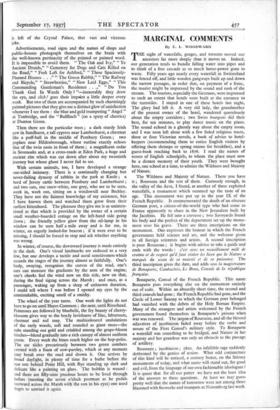MARGINAL COMMENTS
By E. L. WOODWARD
THE sight of waterfalls, gorges, and torrents moved our ancestors far more deeply than it moves us. Indeed, our generation tends to bundle falling water into pipes and to think of a free cascade as so much horse-power gone to waste. Fifty years ago nearly every waterfall in Switzerland was fenced off, and little wooden gangways built up and down the narrow passages, in order that, on payment of a franc, the tourist might be impressed by the sound and rush of the stream. The tourists, especially the Germans, were impressed to such an extent that hotels were built at the entrance to the turnstiles. I stayed in one of these hotels last night, The glory had left it. A very old lady, the grandmother of the present owner of the hotel, wandered querulously about the empty corridors ; two Swiss bourgeois did their best, for ten minutes, to play dance music on the piano. The sound echoed in a ghostly way about the empty room, and I was soon left alone with a few faded religious tracts, three or four Victorian novels, a book of advice to hotel- keepers (recommending them to entice English visitors by offering them shrimps or spring onions for breakfast), and a guest-book reaching back to 1876. I read the names of scores of English schoolgirls, to whom the place must now be a distant memory of their youth. They were brought here, one school at a time, to admire the Wildness and Majesty of Nature.
The Wildness and Majesty of Nature. There you have it ; Rousseau and the rest of them. Curiously enough, in the valley of the Arve, I found, at another of these exploited waterfalls, a monument which summed up the taste of an age. This monument was put up in the year IX of the French Republic. It commemorated the death of an obscure German poet, a citizen-of-the-world type who had come to France apparently to share in the New Jerusalem built by the Jacobins. He fell into a crevasse ; two Savoyards found his body and the prefect of the department set up the monu- ment over his grave. There are three inscriptions on the monument. One expresses the honour in which the French government held science and art, and the welcome given to all foreign scientists and artists. A second inscription is pure Rousseau ; it begins with advice to take a guide and ends with the words : c'est avec un rec-iteillement mile de crainte et de respect qu'il fact visiter les helix que la Nature a marques du sceau de sa maieste et de sa puissance. The third inscription gives the date, and adds sous la magistrature de Bonaparte, Cambaceres, Le Brun, Consuls de la republique franfaise.
Bonaparte, Consul of the French Republic. This name Bonaparte puts everything else on the monument entirely out of scale. Within an absurdly short time, the second and third consuls had gone ; the French Republic had gone, and the Circle of Lower Saxony to which the German poet belonged had vanished with the debris of the Holy Roman Empire. Many of the strangers and artists welcomed by the French government found themselves in Bonaparte's prisons when war was renewed. The jargon of Rousseau, and all the blessed adjectives of jacobinism faded away before the verbs and nouns of the First Consul's military style. To Bonaparte a waterfall was something to be bridged, and Nature in her majesty and her grandeur was only an obstacle to the passage of artillery.
Rousseau ; jacobinism ; 1800. An infallible sage suddenly dethroned by the genius of action. What odd conjuncture of this kind will be noticed, a century hence, on the literary monuments of today, and what name will stand out, for good and evil, from the language of our own fashionable ideologues ? It is queer that for all our patter we have not the least idea of the answers to these questions. At least we may guess pretty well that the names of tomorrow were not among those blazoned with fireworks and trumpets at Nuremberg last week.










































 Previous page
Previous page